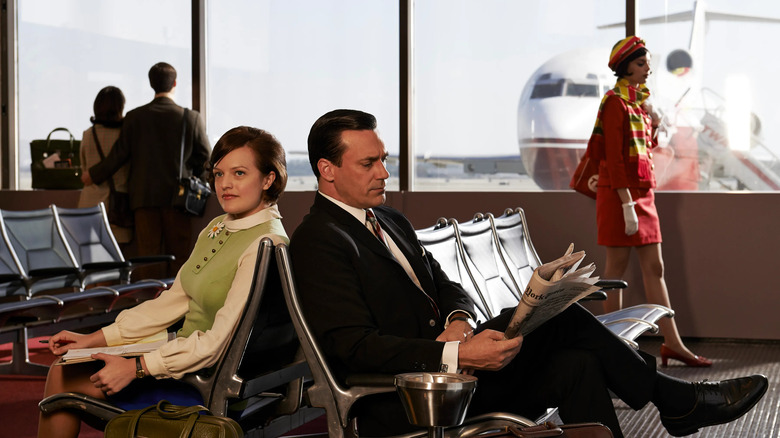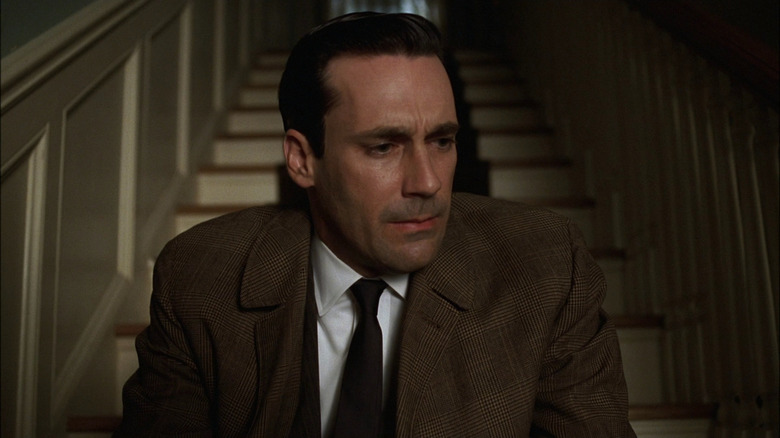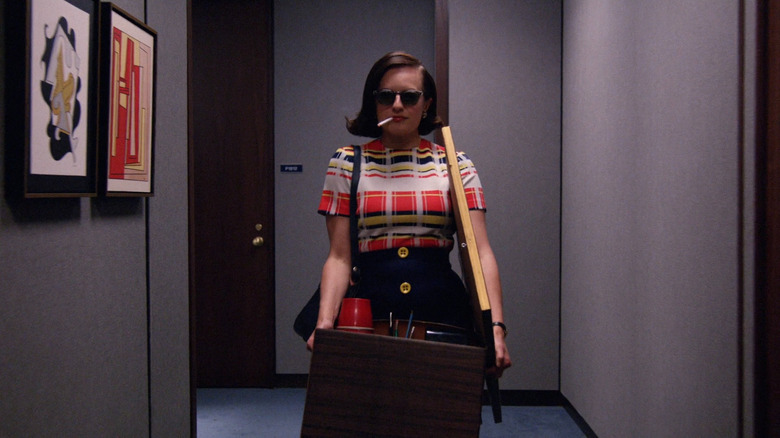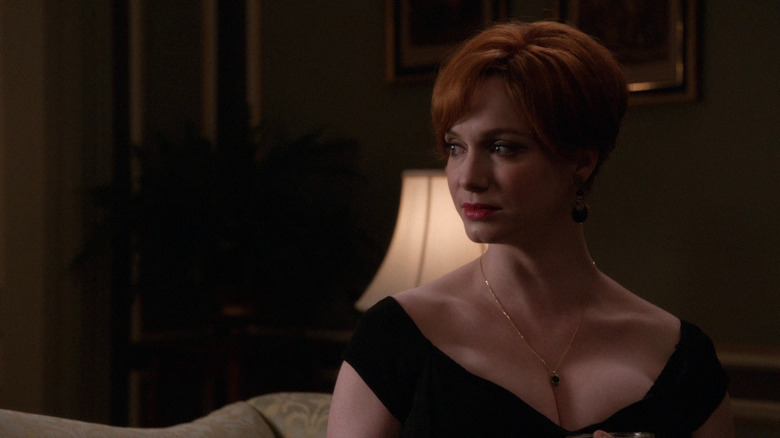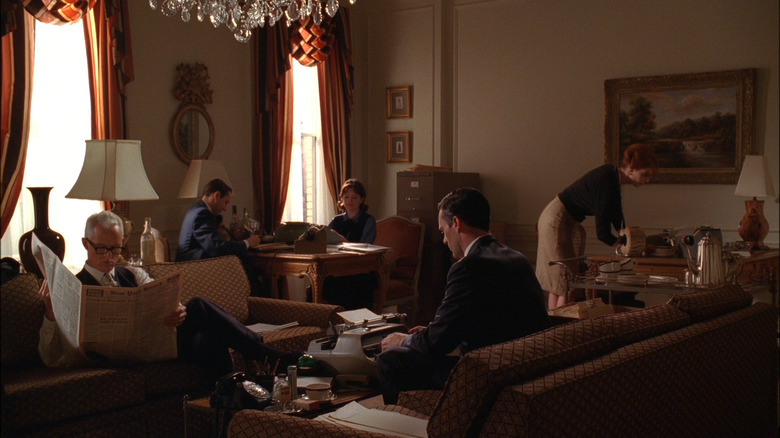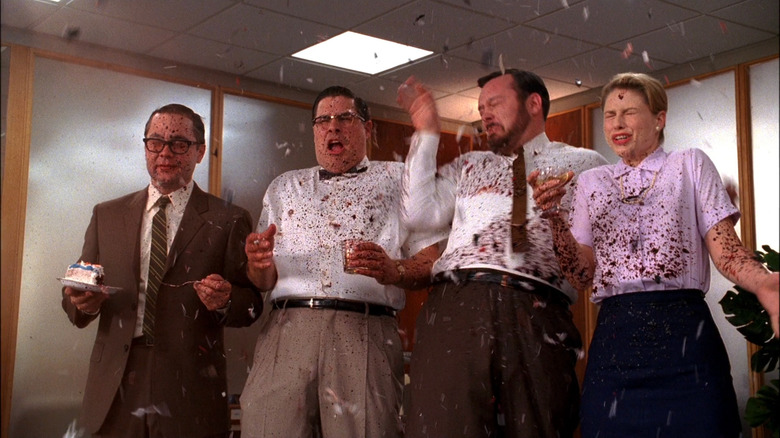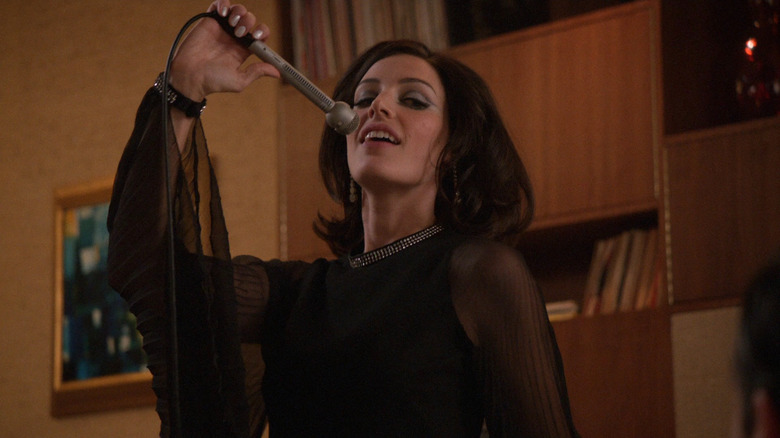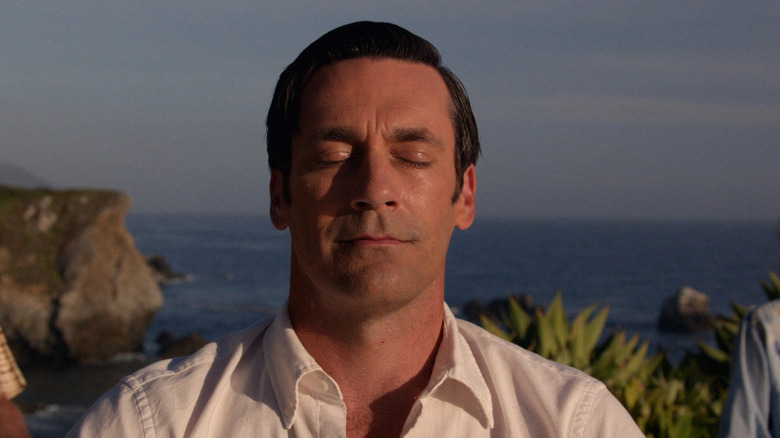The Daily Stream: Mad Men Is Peak TV As It Should Be
(Welcome to The Daily Stream, an ongoing series in which the /Film team shares what they've been watching, why it's worth checking out, and where you can stream it.)
The Show: "Mad Men"
Where You Can Stream It: AMC+, Freevee
The Pitch: Madison Avenue, 1960. Don Draper (Jon Hamm) is the creative director for one of the more successful advertising agencies in New York. He's handsome, knows exactly what to say at every turn, and is something of a savant in his field. With a gorgeous wife (January Jones) and two kids at home, he looks to be the embodiment of the American Dream. He also happens to be a serial cheater, an alcoholic, severely depressed, and harbors some deep, terrible secrets from his traumatizing past that he won't let anyone know about.
In the first episode, Don is assigned a new secretary, Peggy Olsen (Elisabeth Moss). Fresh out of secretarial school, Peggy makes her way into the workplace for the first time, having to navigate rampant misogyny, an evolving cultural understanding of sexuality, and understanding what she really wants to make out of her life. "Mad Men" tracks their two lives throughout the most tumultuous decade in America in the 20th century, in a business that always tries to sell you a bright shiny object when life is anything but that.
A real world anti-hero
Television, particularly in the 21st century, is no stranger to the anti-hero. Chief among them: Tony Soprano in "The Sopranos" (which "Mad Men" creator Matthew Weiner was a writer on) and Walter White in "Breaking Bad." While these are certainly layered, complex characters, what sets Don Draper apart from these fellow unscrupulous protagonists is that Don isn't involved in a life of crime. We see so many stories about those on either side of the law entering a pit of immorality they cannot escape. The darker sides of those characters are usually expressed through acts of violence. Sometimes these violent acts are mistaken as power trips for the audience to go on, even if the intention was the exact opposite. There's always a little something sensationalistic about on-screen violence perpetrated by a protagonist.
When Don lashes out, it's purely emotional violence that he inflicts on those around him and himself. Because of this, there's no mistaking the intent. If he delivers a cutting, disparaging line to Peggy, it cuts us just as deeply. But the flip side of that is also true. We could see Don falling back into his old ways of womanizing and feel sorry for him. Don Draper is a human being. He may be a constructed persona, but underneath is a human making human choices, and whether we like or hate what he does, we always understand him.
This is why I struggle with shows like "Breaking Bad," which I have started and stopped a number of times. At a certain point, I find my empathy slipping away from Walter White. Not so with Don Draper.
The not-so-secret weapon
There are essentially two types of TV pilots: premise and non-premise pilots. Premise pilots start everything at the beginning of the story. Something like "Community" or "Lost" fits this mold, as the characters all meet each other and set the story in motion. Then there are the non-premise pilots, which just drop you into the world and force you to catch up. Think of "The Simpsons" or "House" for a show like this. "Mad Men" straddles the line between the two thanks to having two main characters.
You see, "Mad Men" may have Don Draper plastered all over the promotional material, but he is not the show's sole protagonist. Elisabeth Moss' Peggy Olsen is every bit as much the lead of this show as Don. She is truly our entry point into this world of advertising, and because we see her start at the bottom rung of the totem pole as a woman, we immediately see beneath the veneer of glamor. Her introduction involves being stuck in an elevator while three future co-workers verbally objectify her for absolutely no reason. With that as the starting point, the evolution of Peggy is arguably the more fascinating half of "Mad Men," filled with the most adversity and triumph of the show.
"Mad Men" would not work at all if it was hyper-focused solely on Don. We need a generational counterpoint that can experience this world in an entirely different way, and how those two people connect is when the show truly cooks with gas. A show with a male-female relationship at its center that is entirely aromantic is so rare, and Don and Peggy's tumultuous and rewarding kinship separates this show from so many others.
An outrageously good supporting cast
Jon Hamm and Elisabeth Moss are incredibly well known now, but we must remember they were relative nobodies when the show premiered. Moss had a recurring role on "The West Wing," and Hamm was a guy doing any gig that he could get, be it a guest spot on a sitcom or a commercial. The same extends down to the vast supporting cast who collectively created dozens of characters that have taken up parts of my brain that should have been reserved for touching childhood memories. At any given point throughout the show's seven seasons, there are at least a dozen series regulars with a bevy of recurring players around them, each of whom allows us a unique window into American life in the 1960s.
My personal favorite character on the show is Joan Holloway, the de facto office manager of the advertising agency. She begins the show as a woman who has found ways to use her sexuality as a means to thrive within the misogynistic, patriarchal structure of the office, as it's her belief that one day she'll be able to dispense with this culture and head off into a nice married life. Might as well enjoy it in the moment, right? Joan's evolution of understanding her own confidence and how she engages with business is one of my favorite storylines throughout the show, and my favorite episode of the series, "The Other Woman" (season 5, episode 11), confronts this in a heartbreaking, deeply uncomfortable way.
Along with Joan, you have Vincent Kartheiser's insecure Pete Campbell, John Slattery's wise-cracking Roger Sterling, January Jones' deeply depressed Betty Draper, Jessica Paré's free-spirited Megan Calvet, Jared Harris' emotionally trapped Lane Pryce, and so many more, all of whom you fully understand as people.
TV that doesn't try to be something else
Something I am incredibly tired of hearing from television show creators is that their show is more like a ten-hour movie than it is a television series. If I hear that, you instantaneously make me less interested in your show. The two mediums share disciplines, like cinematography, writing, acting, etc., but their structure and appeal are very different. I find it to be rather insulting to television when shows are framed that way. One medium isn't superior to the other. Each has its own strengths and weaknesses.
Yes, "Mad Men" looks as good as just about any movie made in the last 20 years, but if you watch an episode, you would never mistake it as anything other than an episode of television. Every single hour of "Mad Men" is its own distinct piece. There are plenty of serialized elements throughout the show, but the core plots of every episode generally remain isolated.
Far too many shows are more concerned with teasing out what will happen in the future, but proper television is always concerned with the here and now of each episode. Matthew Weiner and his team of writers perfectly understand that the key to making "prestige" television isn't in pretending what you're making is something that it isn't. It's making the best version of the thing you are making. And because every episode is its own finely crafted entity, rewatching the show is so easy. You never feel as if something is filler or a stopgap. I am someone who finds myself often falling off of TV shows because they aren't structured this way. I don't know how many times I've gone through the entirety of "Mad Men."
By the way, the show is quite funny
Though this show deals with a ton of incredibly weighty subject matter, be it depression, gender, race, addiction, or countless other themes, "Mad Men" could not be further from a dirge that you struggle to get through every episode, making you feel bad on a constant basis. The show aims to showcase every side of a human being, and that also includes the reasons why we love people. We want to see their triumphs, their redemptions, and we want them to make us laugh.
"Mad Men" features some of the most heartbreaking moments I've ever seen in a TV show but also some of the funniest, despite not classifying it as a comedy. That mostly comes from the whip-smart dialogue we can hear in every single episode. When Jon Hamm's Don Draper and John Slattery's Roger Sterling sit down over a couple of drinks and shoot the breeze, it can be some of the best banter on TV this side of Jerry Seinfeld and George Costanza. But "Mad Men" isn't afraid of big comedic set pieces either, like when a man's foot is sliced off by a lawnmower being driven through the office or when everyone at work is given Dr. Feelgood-esque speedballs. The tragedies make the humor even funnier and vice-versa.
A timeline of America in the 1960s
The 1960s will always be the most intriguing, exciting, and complicated decade of the United States in the 20th Century. You have the civil rights movement, Vietnam, the sexual revolution, second-wave feminism, the space race, the Cold War, multiple political assassinations, and more, and "Mad Men" gets to cover all of it through the eyes of those who make the rules, those content with the rules, those who want to play by the rules, and those who want to overturn the apple cart. Most stories about the '60s need to hyper-focus on one area, and the ones that do take a wider view are never able to actually dig in on these subjects with anything meaningful. "Mad Men" is a rarity in that it gets to tackle so many different political issues from as many perspectives. Yes, its one weakness is race, as the vast majority of the cast over seven seasons is white, but that is a statement in and of itself.
Along with the society of the decade, we also get to have a tour of the aesthetics of the 1960s, which were in upheaval just as much as the politics. The evolving looks aren't just for fun; how each character's style evolves over the course of the show speaks so much about how they embrace or reject the time they are living in. Costume designer Janie Bryant is arguably the series' MVP, creating specificity through fabric, and that specificity is both for the era and the people. It's a visual feast.
A cultural phenomenon for a reason
"Mad Men" first premiered on AMC back in 2007, when that network was essentially discount Turner Classic Movies. It was instantaneously seized upon by both critics and audiences, winning Best Drama at the Emmys on its very first season (which it would repeat for the next three seasons as well). Something that comes out of the gate that hot usually trails off in quality, but that couldn't be further from the truth in the case of "Mad Men." In fact, my favorite season of the show, season 5, was one where they didn't end up winning that Emmy.
So much of the reason "Mad Men" was such a burst of energy when it debuted was that outside of a couple of HBO shows, this level of craft, sophistication, and drama was rarely seen on TV. While that is now the norm, "Mad Men" still ends up standing head and shoulders above just about all of them. Newness may have been why the show hit, but it's an almost unmatchable standard of quality which has made it last. So, if you haven't watched "Mad Men" before, you are in for such a treat. If you have watched it already, another rewatch never hurt anybody.
